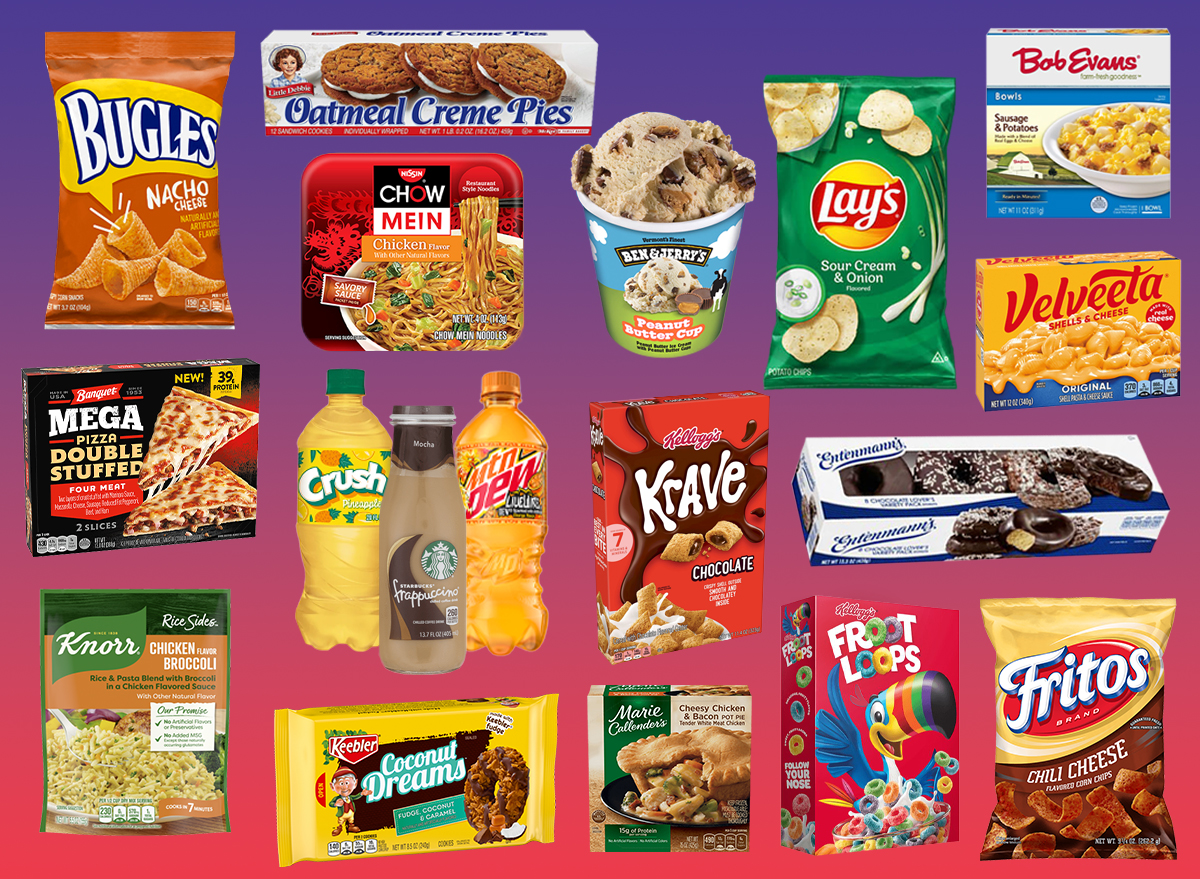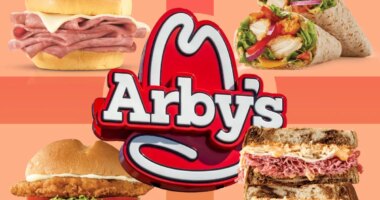The product recommendations in this post are recommendations by the writer and/or expert(s)
interviewed and do not contain affiliate links. Meaning: If you use these links to buy
something, we will not earn a commission.
Grocery shopping is an intimidating activity for some people. Wandering the aisles, reading the nutrition labels, trying to decide what you want to throw into your basket and what is worth leaving on the shelf—it can all feel like quite an overwhelming task. And even though this might come easier to some people, the majority of grocery shoppers may benefit from learning more about the healthiest and unhealthiest grocery store foods available.
One of the hardest parts about shopping at the grocery store is not knowing what you’re really getting with a product. Companies may use certain lingo on their packaging for marketing purposes, but it doesn’t guarantee that you’re getting a healthy food item. This is especially true with processed items like cereals, frozen meals, pastries, and breads, where you’ll commonly find companies trying to make their products seem better than they really are.
But don’t fret, we’ve done some of the grunt work for you and have gathered 55 of the unhealthiest grocery store foods to avoid—all divided by category so you can shop even easier. Read on, and for more healthy grocery shopping tips, make sure to check out 28 Best High-Protein Store-Bought Snacks.
Pasta & Grains
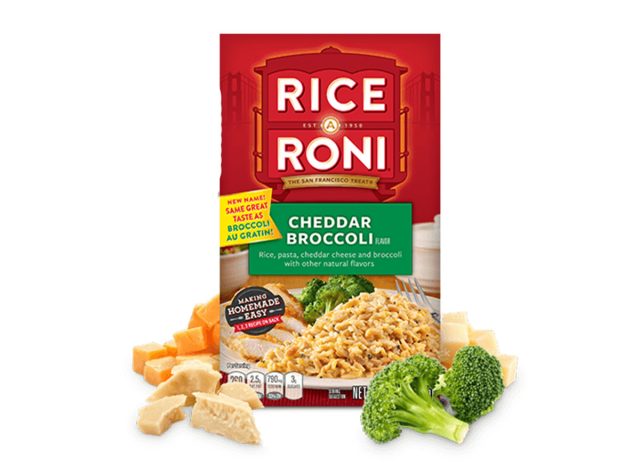

Per serving: 260 calories, 6 g fat (2.5 g saturated fat), 790 mg sodium, 47 g carbs (2 g fiber, 3 g sugar), 7 g protein
Rice-A-Roni gives you the option to make a quick rice dish with little to no effort, but this instant rice contains a lengthy ingredients list with things like partially hydrogenated palm oil—which is known to potentially contribute to various heart issues—as well as 2.5 grams of saturated fat and 790 milligrams of sodium per serving.
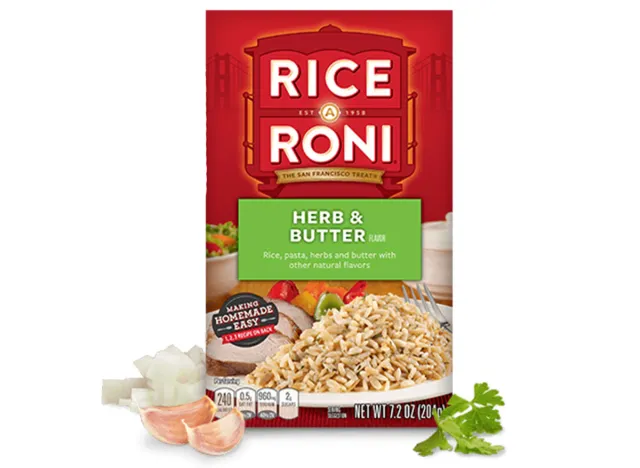

Per serving: 250 calories, 1.5 g fat (0.5 g saturated fat), 960 mg sodium, 53 g carbs (1 g fiber, 2 g sugar), 3 g protein
Similar to the Rice-A-Roni Cheddar Broccoli flavor, this brand’s Herb & Butter is also considered an unhealthy option because of some of its less-than-desirable ingredients like hydrogenated palm oil and corn syrup. Not to mention, each serving of this rice comes with a whopping 960 milligrams of sodium. According to the FDA, the average adult should limit their sodium consumption to no more than 2,300 milligrams per day, and those with heart issues should keep it closer to 1,500 milligrams. This rice gets you far too close to these limits for just one side item.
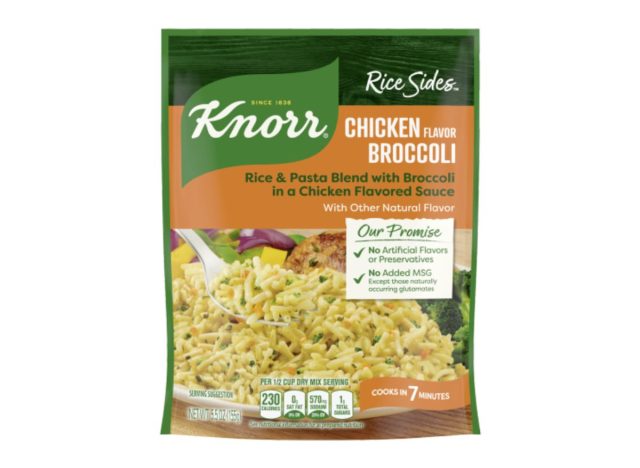

Per serving: 230 calories, 1.5 g fat (0 g saturated fat), 660 mg sodium, 45 g carbs (0 g fiber, 1 g sugar), 6 g protein
There’s a pattern here with instant rice dishes being some of the unhealthiest grocery store foods because of their high levels of sodium, and the Knorr Chicken Broccoli Rice is no exception.
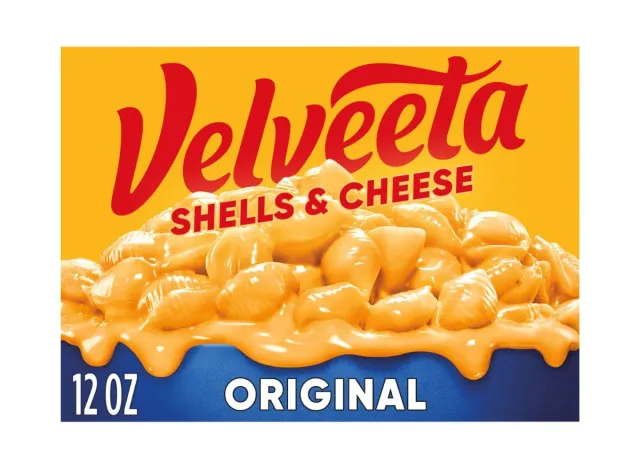

Per serving: 370 calories, 12 g fat (3 g saturated fat), 860 mg sodium, 49 g carbs (1 g fiber, 4 g sugar), 13 g protein
Everyone loves a creamy bowl of mac and cheese, and Velveeta is famous for its quick, cheap, and delicious boxed mac and cheese that is creamier than those powdered cheese options. Unfortunately, these cheesy shells are better if consumed in moderation, as it’s loaded with 860 milligrams per serving and three grams of saturated fat.
It’s also important to note that Velveeta Shells are made with sodium phosphates, which are additives commonly found in processed meats that have been linked to vascular damage.
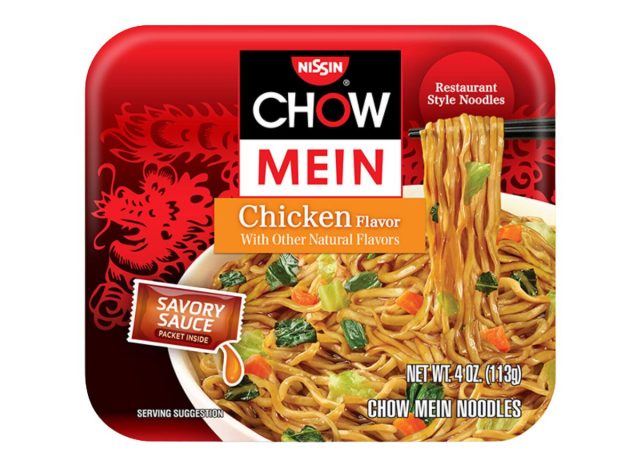

Per serving: 500 calories, 22 g fat (9 g saturated fat), 1,170 mg sodium, 64 g carbs (2 g fiber, 8 g sugar), 10 g protein
It doesn’t take more than one quick glance at the nutrition information for these Chow Mein Noodles by Nissan to see why they’d make the list of unhealthiest grocery items. In one container of noodles, you’re getting over 1,100 milligrams of sodium (almost half of your daily limit) and nine grams of saturated fat. The American Heart Association suggests that the average adult limit their intake of saturated fat to around 13 grams per day, so this chow mein is getting you a bit too close to this daily limit.
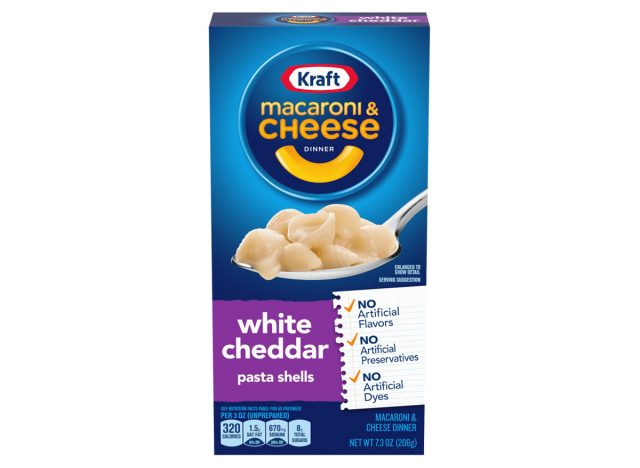

Per serving: 320 calories, 3.5 g fat (1.5 g saturated fat), 670 mg sodium, 59 g carbs (2 g fiber, 8 g sugar), 12 g protein
You may not think that the nutrition information for these Kraft White Cheddar Shells looks all that bad at first glance, but with 59 grams of carbohydrates and only two grams of fiber to slow digestion, you run the risk of spiking your blood sugar with this mac and cheese as your meal. The 670 milligrams of sodium is not the highest on the list, but it’s still less than ideal when choosing a boxed macaroni.
Chips, Pretzels & Snacks
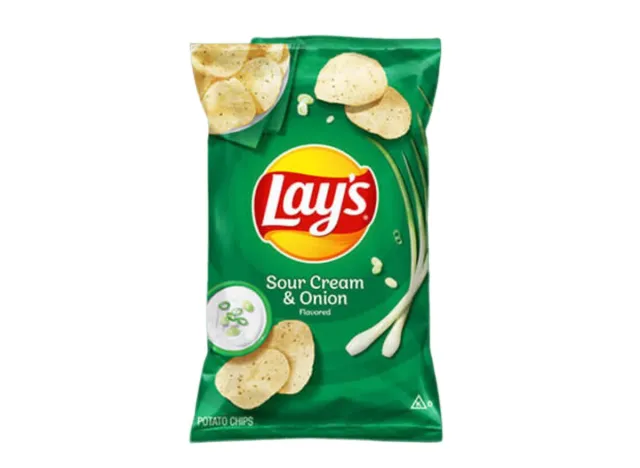

Per serving: 160 calories, 10 g fat (1.5 g saturated fat), 160 mg sodium, 15 g carbs (1 g fiber, 1 g sugar), 2 g protein
The perfect afternoon snack is one that has enough fiber and protein to keep you feeling satiated until your next meal, but potato chips don’t often meet this criteria. For instance, Lay’s Sour Cream & Onion chips contain only one gram of fiber and two grams of protein, which means that even if you chow down on a bowl of these, you’ll be left feeling hungry and unsatisfied.
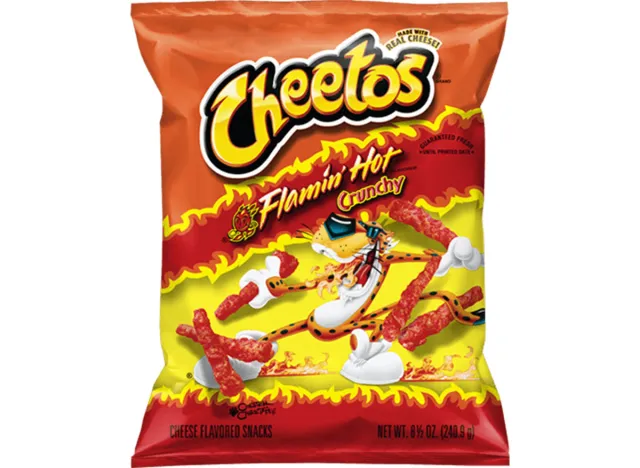

Per serving: 160 calories, 10 g fat (1.5 g saturated fat), 310 mg sodium, 16 g carbs (<1 g fiber, 0 g sugar), 1 g protein
Cheeto’s Flamin’ Hot Crunchy snacks may taste delicious, but they’re not an ideal snack for those in need of something to fill them up and satisfy their cravings. Not only do they have less than one gram of fiber and only one gram of protein, meaning they won’t fill you up at all, but each serving also contains 310 milligrams of sodium, which is a number that can easily add up when you’re digging into the bag.
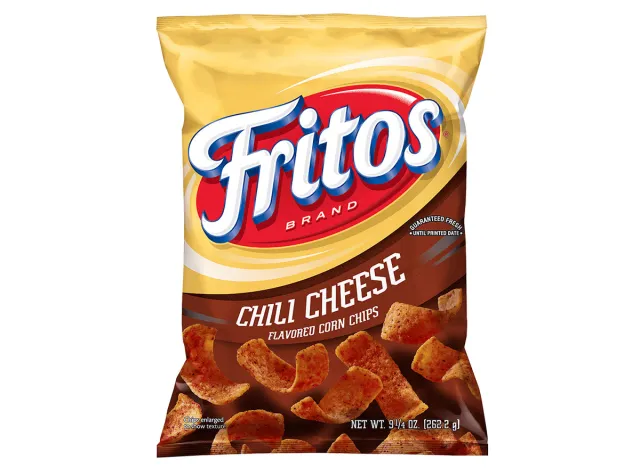

Per serving: 160 calories, 10 g fat (1.5 g saturated fat), 210 mg sodium, 16 g carbs (1 g fiber, <1 g sugar), 2 g protein
The Fritos Chili Cheese Flavored Corn Chips have similar qualities to the other snacks on our list of unhealthy grocery store foods, such as higher levels of sodium and low levels of fiber and protein. In addition, these corn chips also contain maltodextrin as one of the first ingredients, which is an additive that has been associated with the possible alteration of your gut microbiome.
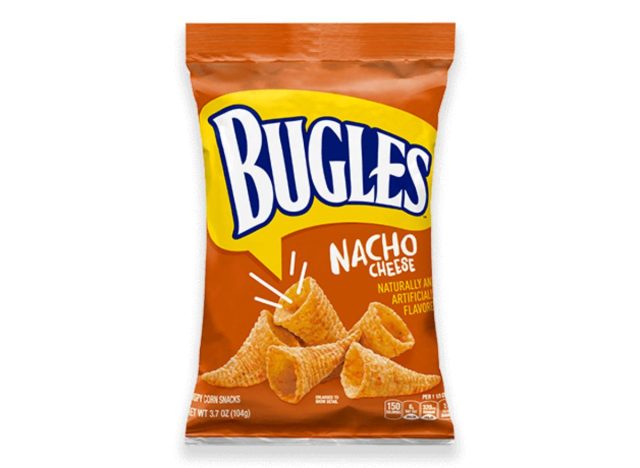

Per serving: 150 calories, 8 g fat (6 g saturated fat), 320 mg sodium, 19 g carbs (<1 g fiber, 2 g sugar), 2 g protein
Bugles may be satisfying in the immediate sense because of how savory they are, but they will leave you feeling hungry and unsatisfied because of their low fiber and protein content. This bag also contains six grams of saturated fat, which is almost half of the recommended daily limit.
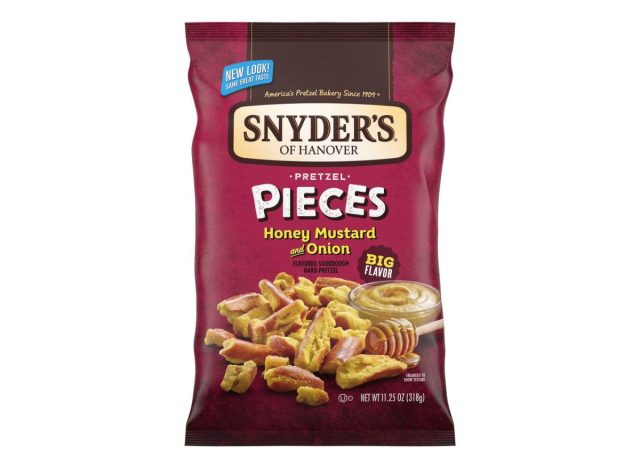

Per serving: 140 calories, 7 g fat (3 g saturated fat), 240 mg sodium, 18 g carbs (1 g fiber, 3 g sugar), 2 g protein
This pretzel snack contains only a gram of fiber and two grams of protein, as well as 240 milligrams of sodium per serving—which, by the way, is only 1/3 of a cup.
If you’re really in the mood for pretzels, you’d be better off opting for a few regular pretzels dipped in hummus or eaten with a handful of your favorite vegetables for a more nutrient-dense snack.
Processed Meats
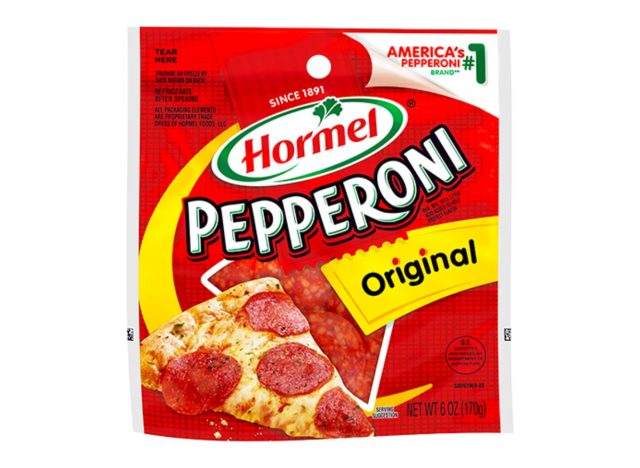

Per serving: 150 calories, 14 g fat (6 g saturated fat), 520 mg sodium, 0 g carbs (0 g fiber, 0 g sugar), 5 g protein
It’s important to proceed with caution anytime you consume processed meat, especially if it’s on a consistent basis. Processed meat contains higher sodium levels and more preservatives in order to keep its shelf life longer, which research has shown may pose potential problems. Hormel Pepperoni contains 520 milligrams of sodium per serving, as well as six grams of saturated fat. Not only that, but it contains sodium nitrite, an additive that has been linked to multiple types of cancer like colorectal, breast, and prostate.
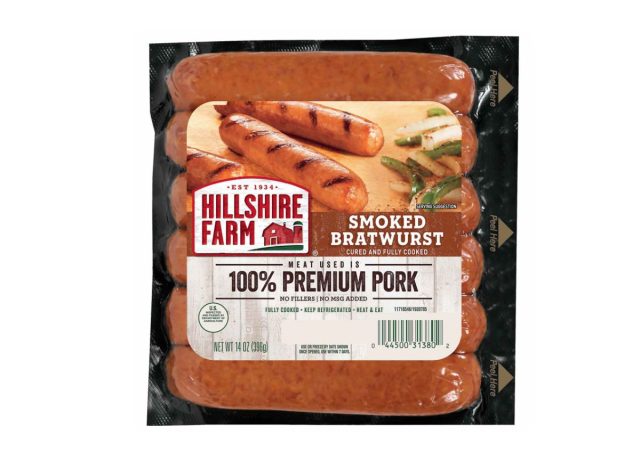

Per serving: 200 calories, 18 g fat (6 g saturated fat), 720 mg sodium, 2 g carbs (0 g fiber, 0 g sugar), 9 g protein
One sausage link should not have 720 milligrams of sodium—that is way too much, as you’ve already come close to a third of your daily max. The levels of sodium aren’t the only thing you have to worry about though, as this bratwurst pork sausage from Hillshire Farms also contains both sodium nitrites and phosphates.
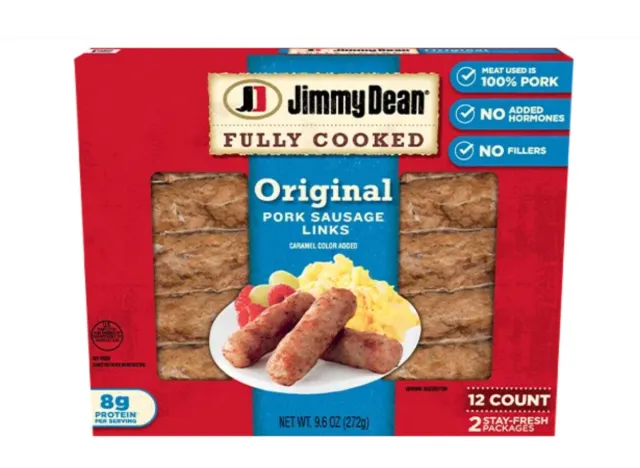

Per serving: 270 calories, 26 g fat (9 g saturated fat), 490 mg sodium, 1 g carbs (0 g fiber, 1 g sugar), 8 g protein
The Pork Sausage Links from Jimmy Dean are less than ideal when you’re looking for a breakfast meat, as this sausage contains almost 500 milligrams of sodium and nine grams of saturated fat in just three links.
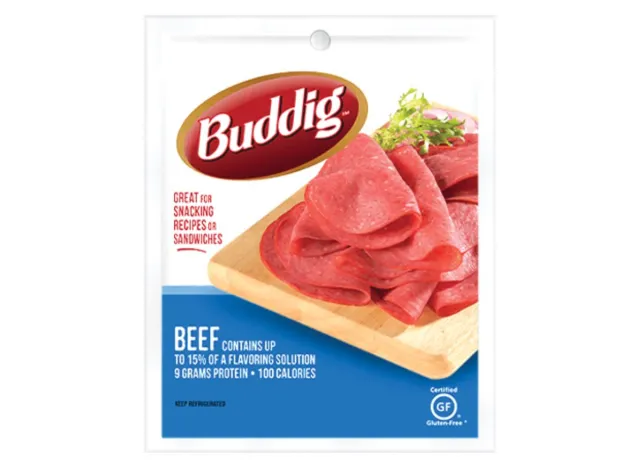

Per serving: 100 calories, 7 g fat (3 g saturated fat), 600 mg sodium, 1 g carbs (0 g fiber, 1 g sugar), 9 g protein
Sure, the nine grams of protein that you’re getting with each serving of Buddig Beef can help you stay full, but with 600 milligrams of sodium and sodium nitrite on the ingredients list, you’re better off steering clear of this processed meat.
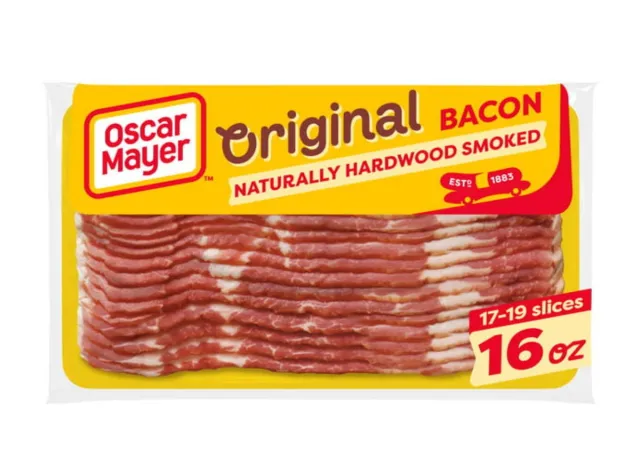

Per serving: 90 calories, 7 g fat (2.5 g saturated fat), 350 mg sodium, 0 g carbs (0 g fiber, 0 g sugar), 7 g protein
The smell of bacon sizzling on the skillet in the morning is one of the best ways to start your day, but there are some bacon brands that are worse than others. Oscar Mayer Hardwood Smoked Bacon, for example, is one of the unhealthiest, as it contains two potentially harmful preservatives: sodium nitrite and sodium phosphates.
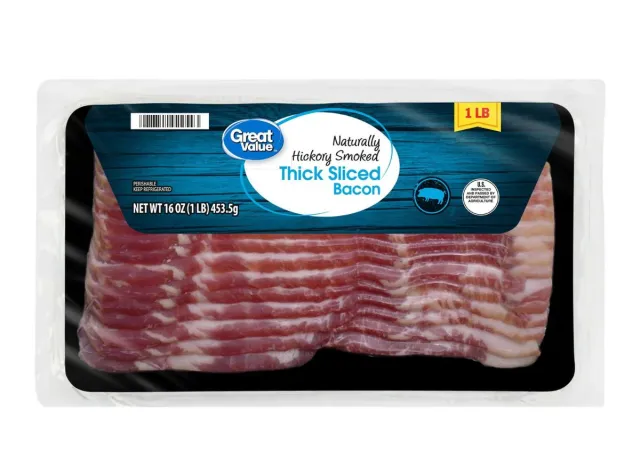

Per serving: 140 calories, 12 g fat (4 g saturated fat), 430 mg sodium, 0 g carbs (0 g fiber, 0 g sugar), 8 g protein
The serving size for Great Value’s Thick Sliced Bacon is only two slices, making it fairly easy to surpass without realizing it. With 430 milligrams of sodium and four grams of saturated fat per serving, not to mention the fact that it contains sodium phosphates and nitrite, it’s better to leave this item on the shelf.
Cereals & Granola
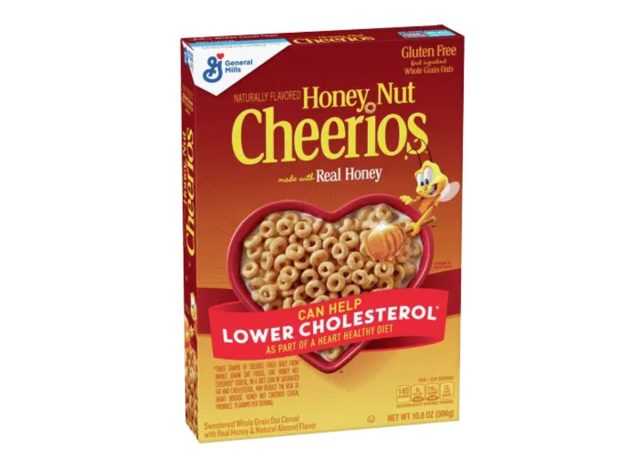

Per serving: 140 calories, 2 g fat (0 g saturated fat), 210 mg sodium, 30 g carbs (3 g fiber, 12 g sugar), 3 g protein
When you’re looking for cereal in the morning, you may want to skip Honey Nut Cheerios.
“This cereal contains high added sugars, contributing to excess calorie intake and increasing the risk of heart disease and high blood sugar levels,” says Lisa Young, PhD, RDN. “Though Honey Nut Cheerios are made from whole grain oats, they still undergo a lot of processing and contain unhealthy ingredients like brown sugar syrup, which adds to sugar content and harmful ingredients such as preservatives.”
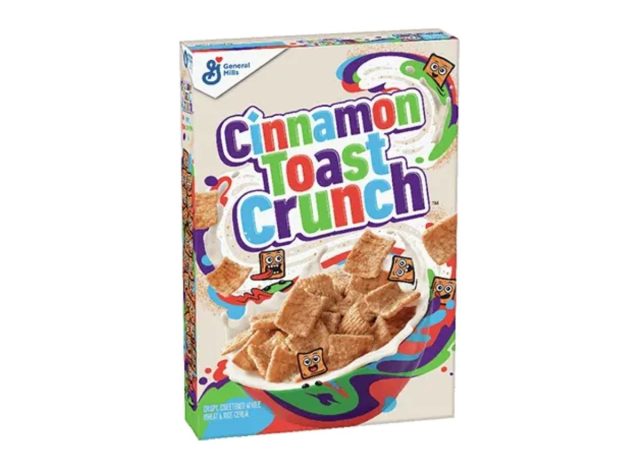

Per serving: 170 calories, 4 g fat (0 g saturated fat), 230 mg sodium, 33 g carbs (3 g fiber, 12 g sugar), 2 g protein
Young also suggests passing on Cinnamon Toast Crunch, or enjoying it every once in a while instead of on a consistent basis. Why? Because “it contains a high amount of added sugar, which may cause spikes in blood sugar levels and increase the risk of weight gain and tooth decay,” she says. Young also adds that this sugary cereal “is low in essential nutrients such as fiber, vitamins, and minerals, thus not ideal for maintaining a nutritious diet.”
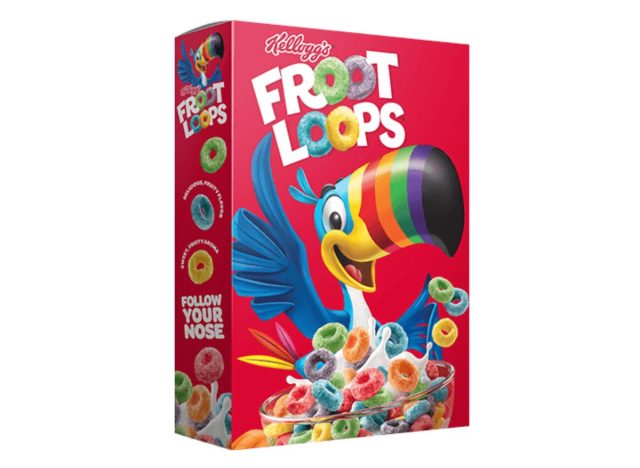

Per serving: 150 calories, 1.5 g fat (0.5 g saturated fat), 210 mg sodium, 34 g carbs (2 g fiber, 12 g sugar), 2 g protein
With 12 grams of added sugar and 210 milligrams of sodium, plus unwanted additives and artificial colorings, Froot Loops are considered one of the unhealthiest cereals you can buy.
“Its added sugars cover a significant amount of the daily added sugar intake and consistent excess consumption can increase blood sugar levels,” says Young, while adding that “They are calorie-dense but also low in fiber and protein, which are essential nutrients for satiety and weight management.”
Not only that, but “Its ingredient list is concerning, as it contains additives, artificial colorings, and partially hydrogenated oil, which impacts cholesterol levels and increases the risk of heart disease.”
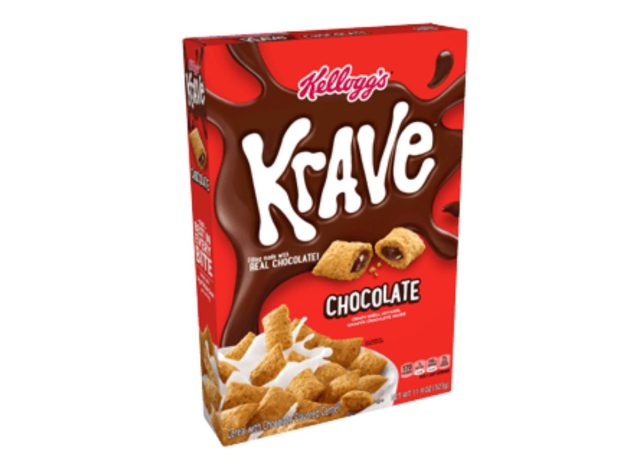

Per serving: 170 calories, 4.5 g fat (1 g saturated fat), 140 mg sodium, 32 g carbs (2 g fiber, 15 g sugar), 3 g protein
Young also puts Krave Chocolate on the list of unhealthiest grocery items. “While being marketed as whole grain, this cereal is not the healthiest option, as it has high amounts of added sugar with sugar being the primary ingredient,” she says. “This is concerning because it can increase the risk of weight gain, heart disease, and diabetes.” Young also adds that Krave is “high in calories and relatively low in fiber, which does not provide a balanced breakfast.”
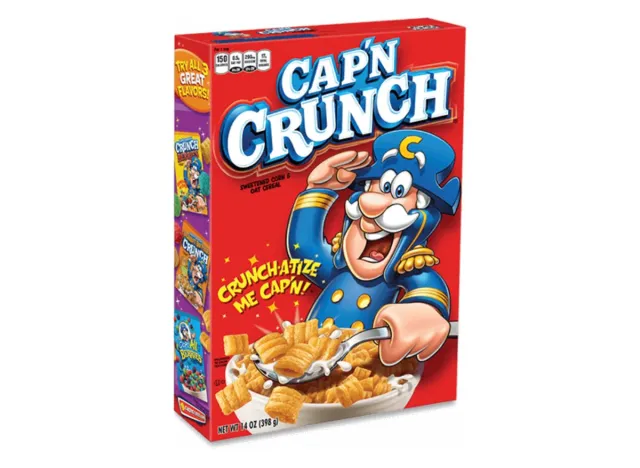

Per serving: 150 calories, 2 g fat (0.5 g saturated fat), 290 mg sodium, 33 g carbs (<1 g fiber, 17 g sugar), 2 g protein
Cap’n Crunch may scratch the nostalgic itch, but eating this for breakfast won’t fill you up and may leave you with even more cravings than before.
“This cereal contains significant amounts of added sugars, which can contribute to weight gain and dental problems,” says Young. “It covers more than half of the recommended daily sugar intake, increasing the risk of chronic diseases such as heart disease and diabetes.”
Along with being high in sugar and low in fiber and protein, Cap’n Crunch is also “highly processed with artificial colors and preservatives like BHT food preservatives, yellow 5, and yellow 6, which may cause health concerns,” adds Young.
Cookies & Pastries
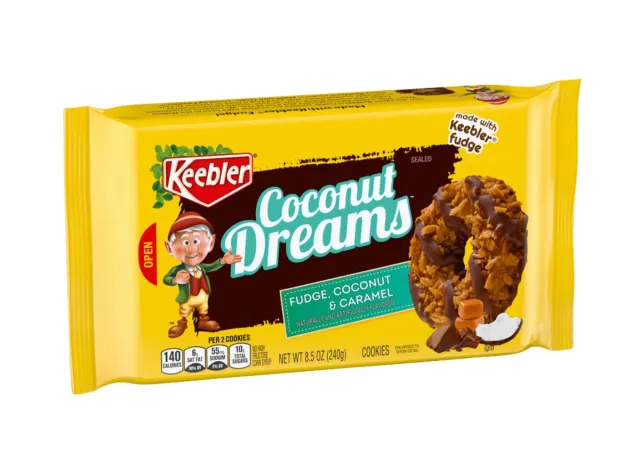

Per serving: 140 calories, 8 g fat (6 g saturated fat), 55 mg sodium, 17 g carbs (<1 g fiber, 10 g sugar), 9 g protein
With 10 grams of sugar, six grams of saturated fat, and a serving size of only two cookies, it’s way too easy to rack up your sugar and fat counts in one sitting with these Keebler Coconut Dreams.
The nine grams of protein is a perk, but with so much added sugar and hardly any fiber to slow digestion, these cookies will leave you feeling hungry and wanting more.
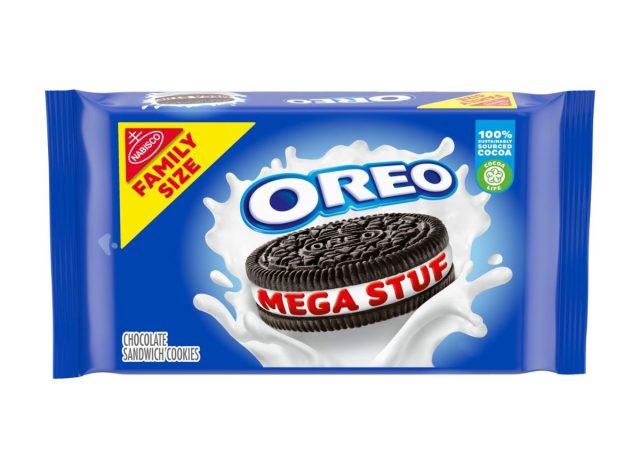

Per serving: 180 calories, 9 g fat (3.5 g saturated fat), 90 mg sodium, 25 g carbs (0 g fiber, 18 g sugar), 1 g protein
Regular Oreos already lack nutritional value, and when you buy the Oreo Mega Stuf, you’re not just getting more creamy filling, you’re getting more sugar, total fat, and saturated fat, too. Just one or two of these cookies doesn’t seem like much, but it’s easy to keep snacking until half of the box is gone, meaning it’s all too easy for these numbers to get even higher.
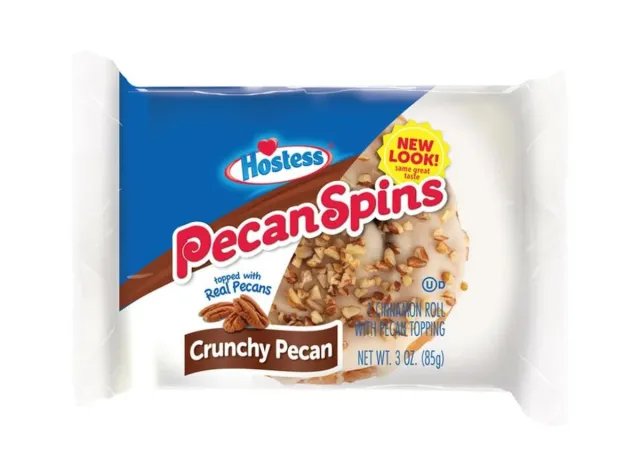

Per serving: 350 calories, 18 g fat (8 g saturated fat), 250 mg sodium, 45 g carbs (3 g fiber, 24 g sugar), 4 g protein
Hostess is a classic choice for to-go pastries you can get just about anywhere, but the ultra-processed nature of these snacks means they’ll fill you up with sodium, added sugar, and saturated fats, and will leave you with more cravings afterward. For example, the Hostess Pecan Spins come with eight grams of saturated fat and 24 grams of sugar, meaning you’re getting awfully close to your daily limits with just one dessert.
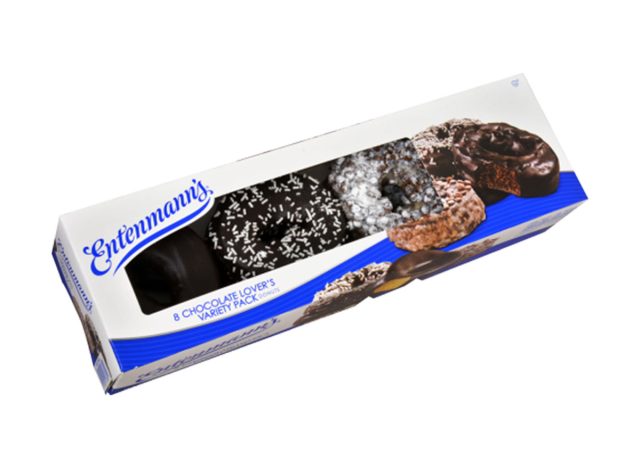

Per frosted donut: 150 calories, 15 g fat (10 g saturated fat), 180 mg sodium, 29 g carbs (<1 g fiber, 16 g sugar), 2 g protein
There’s nothing better than the comfort of a box of Entenmann’s donuts in the morning, but starting your day off with these sugary, ultra-processed treats will leave you feeling hungry and unsatisfied throughout the day. Plus, they’re considered unhealthy grocery items because they’re high in sugar and saturated fat. For example, their Chocolate Frosted Donut contains 16 grams of sugar and 10 grams of saturated fat—numbers that are way too high for just one donut.
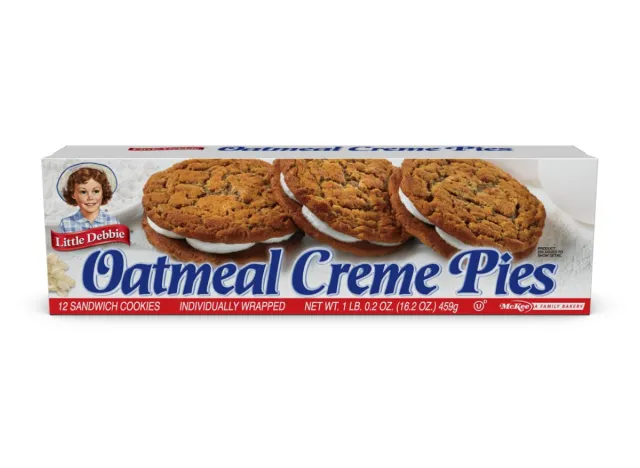

Per serving: 170 calories, 7 g fat (3 g saturated fat), 160 mg sodium, 26 g carbs (1 g fiber, 13 g sugar), 1 g protein
READ RELATED: 60% of Indian Millennial Women Have PCOS, PID Is The Second Leading Menstrual Disorder
There’s something so comforting about a Little Debbie Oatmeal Creme Pie, so we aren’t saying you need to give them up for good. But with 13 grams of added sugar, three grams of saturated fat, and only one gram of fiber and protein, you’re better off saving this for a special occasion instead of snacking on it regularly.
Breads, Tortillas & Wraps (Trista)
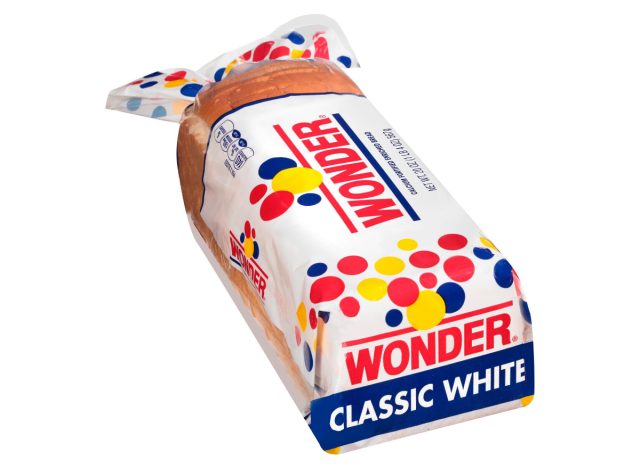

Per serving: 140 calories, 1.5 g fat (0 g saturated fat), 180 mg sodium, 29 g carbs (3 g fiber, 5 g sugar), 5 g protein
You won’t be surprised to find Wonder Bread on this list, as this white bread is notorious for lacking nutrients. “Wonder Bread is often considered unhealthy due to its use of highly refined white flour, which lacks essential nutrients and fiber, and this bread contains added sugars, such as high fructose corn syrup, which can contribute to weight gain and metabolic issues,” says Trista Best, MPH, RD, LD at Balance One Supplements.
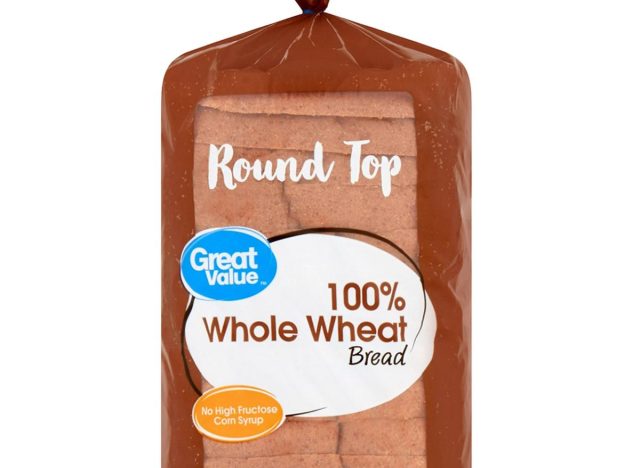

Per serving: 60 calories, 1 g fat (0.5 g saturated fat), 110 mg sodium, 12 g carbs (2 g fiber, 1 g sugar), 3 g protein
Sometimes, even when bread brands use terms like “100% whole wheat,” they can still be considered unhealthy and lack essential nutrients. Take Great Value Wheat Bread, for example.
“This bread can be considered unhealthy due to its use of enriched wheat flour, which is a refined flour that has been stripped of its natural nutrients during processing, and while some nutrients are added back, it lacks the full nutritional benefits of whole grains,” says Best. “This type of flour can lead to quicker digestion and blood sugar spikes, making it less favorable for maintaining stable energy levels and overall health. Opting for whole-grain or whole-wheat bread that contains the entire grain kernel would offer more fiber, vitamins, and minerals.”
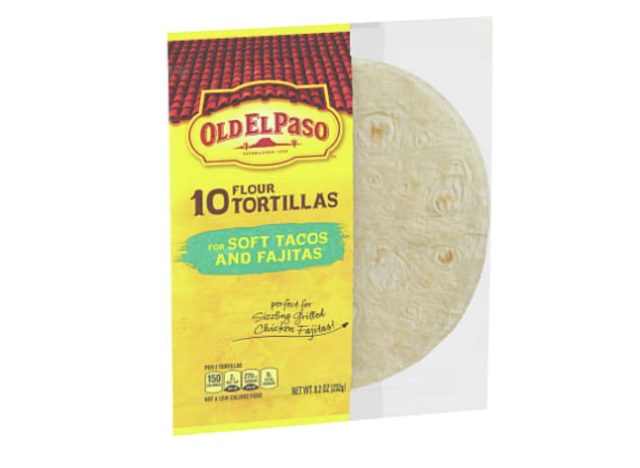

Per serving: 150 calories, 4 g fat (2 g saturated fat), 270 mg sodium, 25 g carbs (<1 g fiber, 0 g sugar), 3 g protein
Whether you’re making tacos, a quesadilla, or a burrito, you may want to pass on using Old El Paso Flour Tortillas.
“Old El Paso tortillas may not be considered healthy due to several factors, including their use of refined flour, which lacks essential nutrients and dietary fiber,” says Best. “Moreover, the inclusion of hydrogenated vegetable oil, which often contains harmful trans fats, can contribute to heart health concerns and inflammation. Trans fats have also been linked to an increased risk of heart disease and other health issues.”
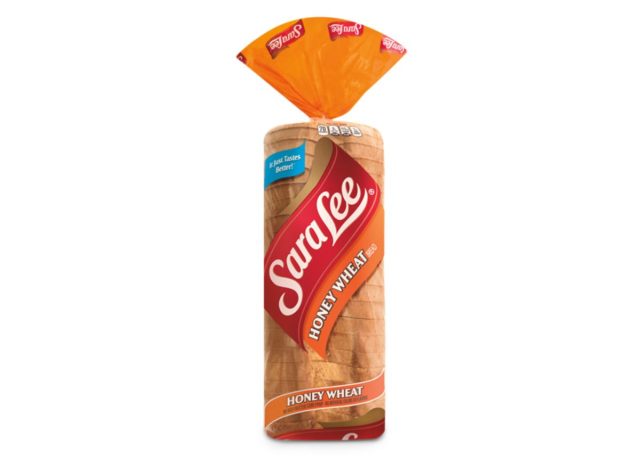

Per serving: 70 calories, 1 g fat (0 g saturated fat), 125 mg sodium, 12 g carbs (<1 g fiber, 2 g sugar), 2 g protein
Another tricky term to watch out for that many bread companies use for marketing purposes is “honey wheat,” because these breads are often just as unhealthy as white breads despite the mention of “wheat” (which, in reality, is just the grain that flour is made from).
“Sara Lee Honey Wheat Bread contains azodicarbonamide, a chemical compound used as a dough conditioner, that has raised concerns because it can break down into potentially harmful byproducts during baking,” says Best. “While it’s approved for use in some countries as a food additive, it’s banned in others, including the European Union, due to health considerations.”
Because of this, Best says “Choosing bread options without additives like azodicarbonamide would be a more prudent choice for promoting a healthier diet and minimizing potential health risks.”
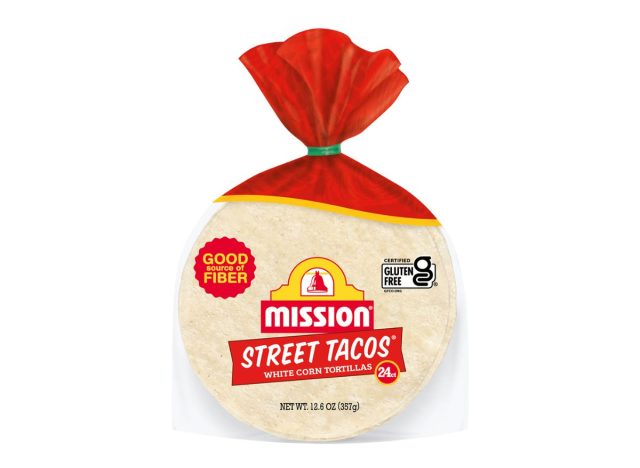

Per serving: 100 calories, 1 g fat (0 g saturated fat), 20 mg sodium, 20 g carbs (2 g fiber, 2 g sugar), 2 g protein
People often assume that corn tortillas are automatically the healthy choice when you’re in the mood for tacos, but this isn’t always true. According to Best, “Mission White Corn Tortillas might be considered unhealthy due to the use of refined white corn flour, which lacks the dietary fiber and nutrients present in whole corn.”
She adds “These tortillas may lack the satiety and sustained energy benefits that whole-grain options provide, and they contain unhealthy fats and excessive sodium, which can contribute to high blood pressure and other heart health issues.”
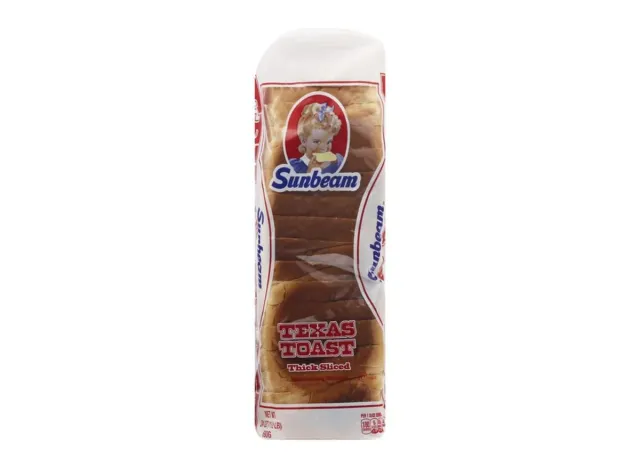

Per serving: 100 calories, 1 g fat (0 g saturated fat), 180 mg sodium, 18 g carbs (1 g fiber, 2 g sugar), 3 g protein
Similar to other breads on our list, this Thick Sliced Texas Toast from Sunbeam lacks nutritional value and essential nutrients. Although the levels of fat and sugar are certainly on the lower end, so is the fiber, meaning this product may spike blood sugar levels.
Sodas
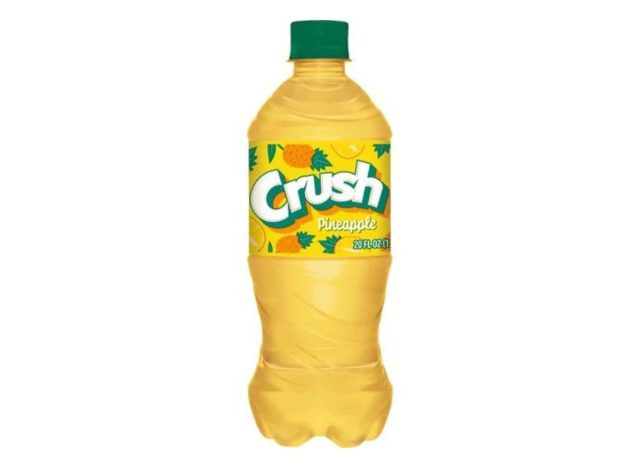

Per serving: 320 calories, 0 g fat (0 g saturated fat), 110 mg sodium, 86 g carbs (0 g fiber, 85 g sugar), 0 g protein
In general, regular soda consumption has been linked to an increased risk of health complications like diabetes, heart disease, and liver cancer. However, some sodas are considered even worse than others because of their sugar content. Take Crush Pineapple, for instance, which has a whopping 85 grams of added sugar per bottle.
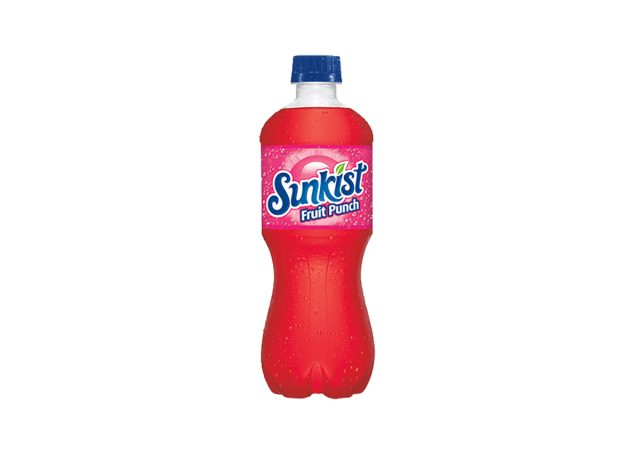

Per serving: 300 calories, 0 g fat (0 g saturated fat), 100 mg sodium, 82 g carbs (0 g fiber, 80 g sugar), 0 g protein
When you’re drinking your sugar calories in the form of soda, you’re not consuming any fiber or protein to slow down how fast the sugar hits your bloodstream, which can cause spikes in your blood sugar.
When it comes to sodas that have the most amount of sugar and therefore are some of the unhealthiest choices, Sunkist Fruit Punch is up there with 80 grams of sugar per bottle.
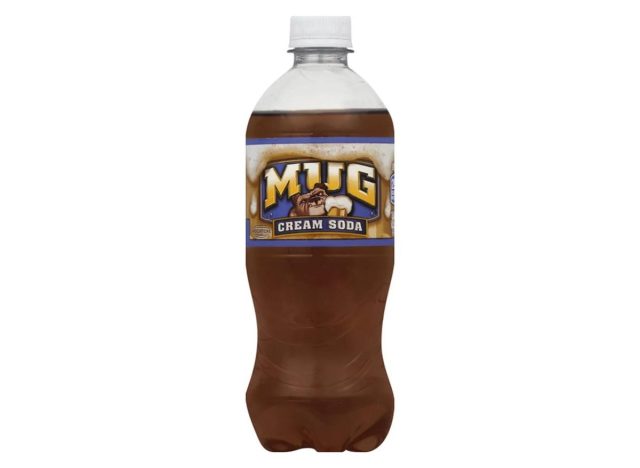

Per serving: 290 calories, 0 g fat (0 g saturated fat), 105 mg sodium, 79 g carbs (0 g fiber, 79 g sugar), 0 g protein
Mug Cream Soda is a sweet and classic beverage, but it’s one that you may want to keep as a “once in a while” option, as this soda packs in almost 80 grams of sugar per bottle.
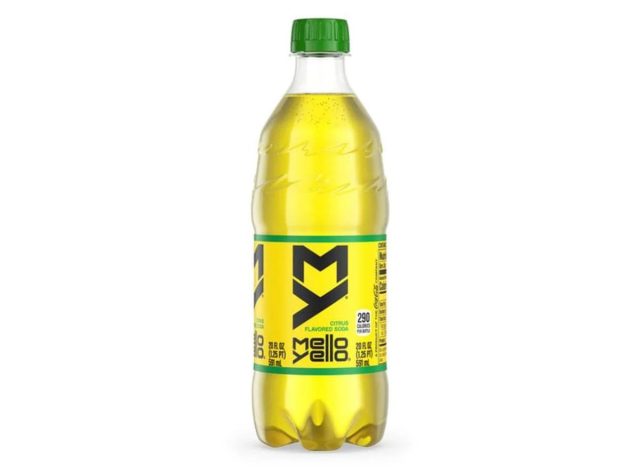

Per serving: 290 calories, 0 g fat (0 g saturated fat), 80 mg sodium, 78 g carbs (0 g fiber, 77 g sugar), 0 g protein
Another sugar bomb of a soda is Mello Yello, which has 77 grams of sugar per bottle. Even though you may not see as much of them in stores right now, which the company says is because they’re putting their focus on more popular products, it’s still one to watch out for when you see it in stores. This isn’t to say you have to ditch it altogether, but it may be best to consume this one in moderation.
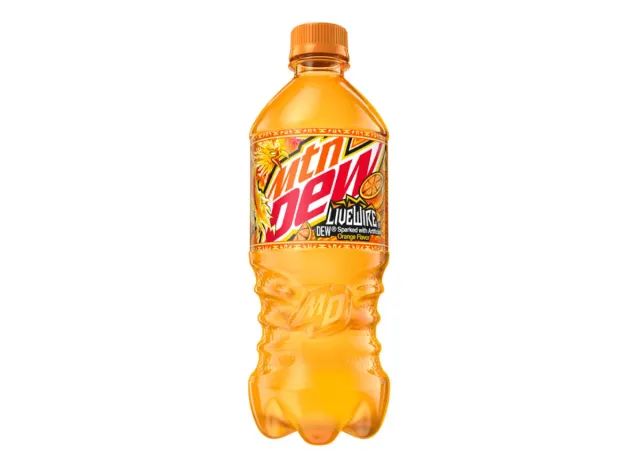

Per serving: 290 calories, 0 g fat (0 g saturated fat), 105 mg sodium, 77 g carbs (0 g fiber, 77 g sugar), 0 g protein
The original Mountain Dew is a popular choice, but their Live Wire flavor adds a nice orange twist. However, the 77 grams of sugar is less than ideal, especially knowing that it won’t give you any fiber or protein to help prevent blood sugar spikes.
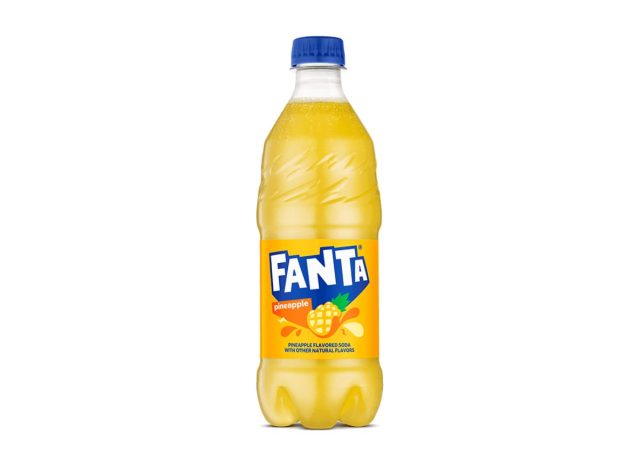

Per serving: 300 calories, 0 g fat (0 g saturated fat), 90 mg sodium, 81 g carbs (0 g fiber, 80 g sugar), 0 g protein
As you can see, some of the fruitiest sodas are the ones that contain the most sugar, and Fanta Pineapple is no exception. With 80 grams of sugar and 300 calories per bottle, you’ll spike your blood sugar instantly and may be left feeling hungrier and with more cravings.
Other Bottled Drinks
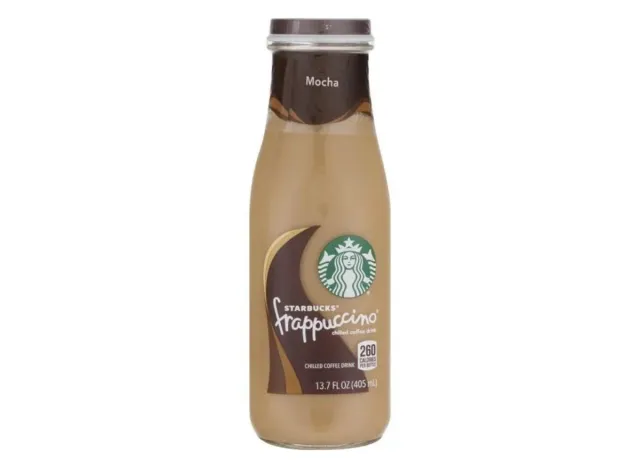

Per serving: 270 calories, 4.5 g fat (3 g saturated fat), 140 mg sodium, 47 g carbs (1 g fiber, 45 g sugar), 9 g protein
A delicious bottled coffee can be the perfect solution when you need something quick, easy, and on the sweeter side, but this Starbucks Bottled Mocha Frappuccino is one of the unhealthiest grocery store coffee options with its 45 grams of sugar and 270 calories in just one serving.
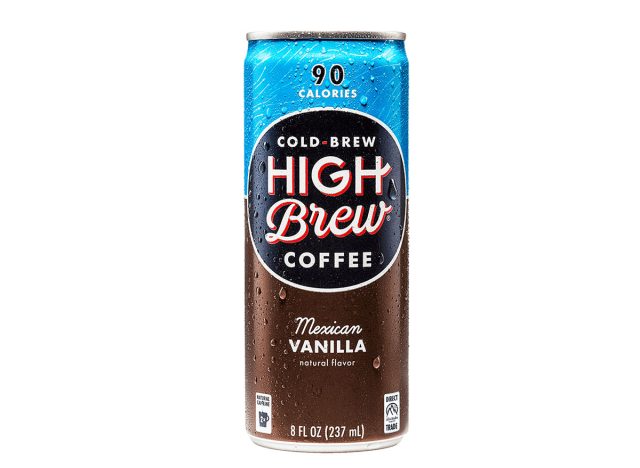

Per serving: 90 calories, 1 g fat (0.5 g saturated fat), 45 mg sodium, 18 g carbs (1 g fiber, 14 g sugar), 3 g protein
High Brew Mexican Vanilla Cold Brew is better for you than the Starbucks Bottled Frappuccino when it comes to sugar, fat, and calorie content, but starting your day off with 14 grams of sugar in just your drink alone is still risky when it comes to potentially causing a spike in your blood sugar.
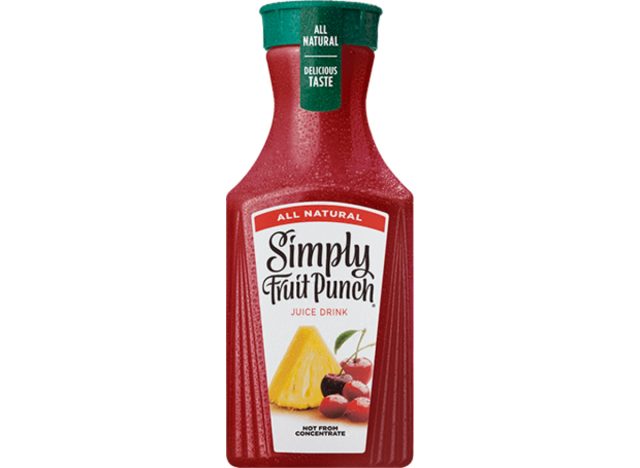

Per serving: 100 calories, 0 g fat (0 g saturated fat), 15 mg sodium, 25 g carbs (0 g fiber, 25 g sugar), 0 g protein
Don’t be fooled by tricky marketing that tries to make certain drinks look healthy when they simply are not. Simply Fruit Punch is a great example, as it’s full of 25 grams of sugar and no fiber or protein to stop your blood sugar from spiking. You’ll also notice on the ingredients list that cane sugar is the second ingredient behind water, which you want to avoid when looking for real fruit juice.
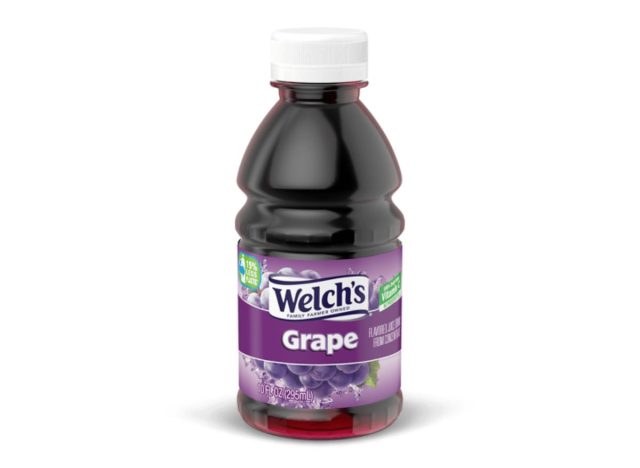

Per serving: 140 calories, 0 g fat (0 g saturated fat), 10 mg sodium, 37 g carbs (0 g fiber, 35 g sugar), 1 g protein
With water and high fructose corn syrup as the first two ingredients, this grape juice from Welch’s is far from the “real thing.” It does contain grape concentrate, but this beverage is mostly sugar. If you’re looking for fresh fruit juice, you’ll want to skip over this one at the store.
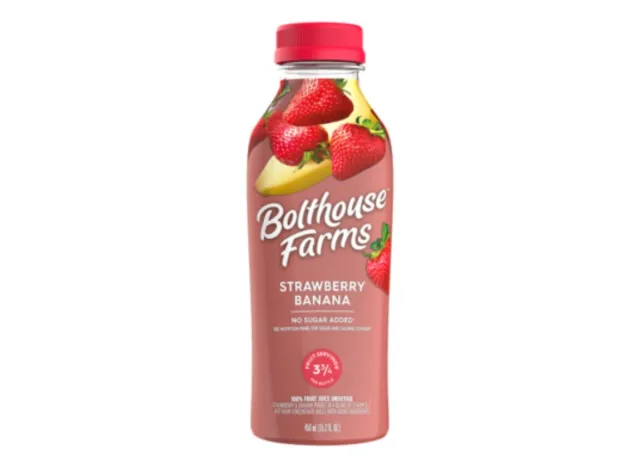

Per serving: 260 calories, 0.5 g fat (0 g saturated fat), 20 mg sodium, 61 g carbs (5 g fiber, 50 g sugar), 1 g protein
Another example of tricky marketing is this Strawberry Banana bottled smoothie from Bolthouse Farms. When you see the word “smoothie,” you may automatically assume that it is a healthy product, but this drink is mostly just full of sugar. Although you are getting five grams of fiber, you’re still getting 50 grams of sugar and almost no protein, so it won’t give you any staying power at all.
Frozen Foods
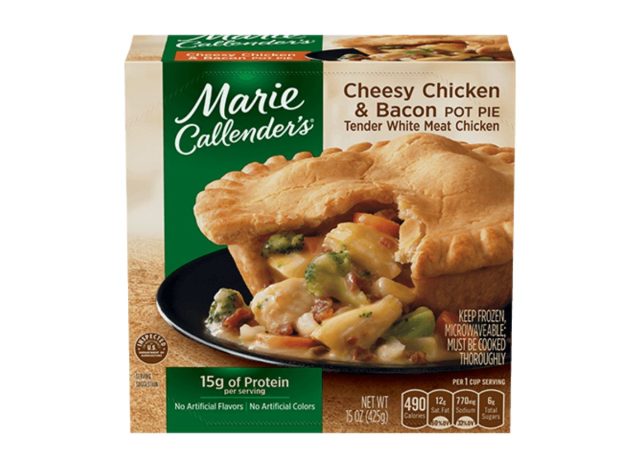

Per serving: 520 calories, 31 g fat (13 g saturated fat), 790 mg sodium, 45 g carbs (1 g fiber, 4 g sugar), 15 g protein
When choosing frozen foods, it’s important to look out for high levels of sodium and fat, especially saturated and trans fats, as well as harmful preservatives. In this Marie Callender’s Chicken & Bacon Pot Pie, you’re getting 790 milligrams of sodium, as well as 13 grams of saturated fat—which is your entire recommended daily limit!
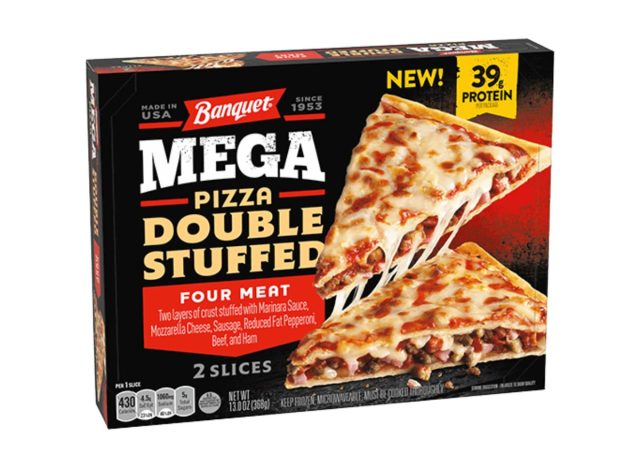

Per serving: 430 calories, 19 g fat (4.5 g saturated fat), 1,060 mg sodium, 44 g carbs (2 g fiber, 5 g sugar), 20 g protein
Just one slice of this Double Stuffed Four Meat Pizza from Banquet contains over 1,000 milligrams of sodium, but if you eat both slices you’ll be nearing your daily limit of sodium in just one sitting.
On top of the high levels of sodium, you’ll also find some potentially harmful preservatives in this pizza, such as sodium nitrites.
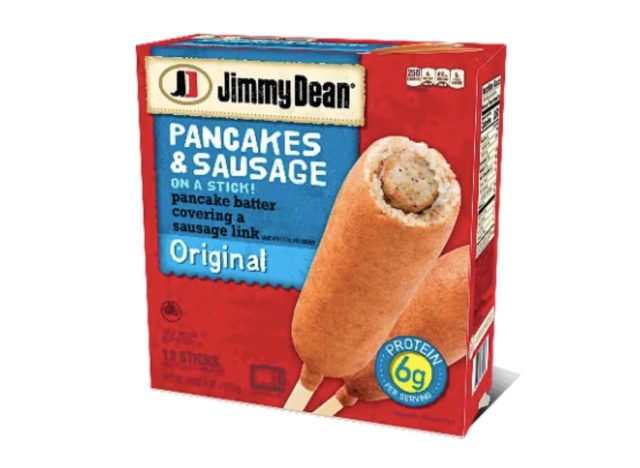

Per serving: 250 calories, 15 g fat (4 g saturated fat), 410 mg sodium, 22 g carbs (1 g fiber, 9 g sugar), 6 g protein
A protein-packed breakfast sausage can be a great addition to your breakfast meal, but you may want to pass on wrapping it in pancake dough. This frozen Pancakes & Sausage on a Stick from Jimmy Dean comes packed full of preservatives, including items like sodium phosphate, which has been linked to potential negative health outcomes.
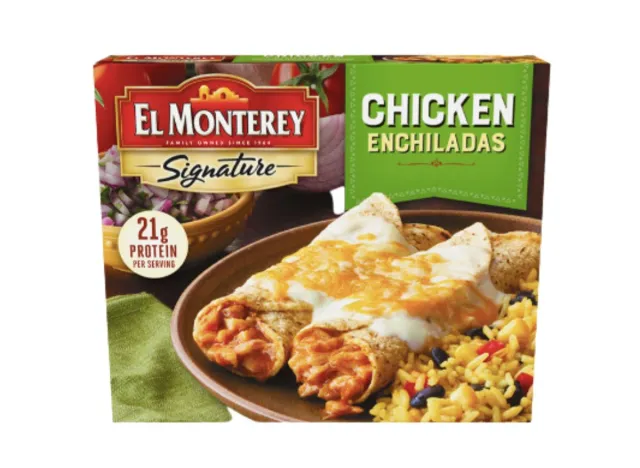

Per serving: 530 calories, 27 g fat (12 g saturated fat), 890 mg sodium, 51 g carbs (2 g fiber, 4 g sugar), 21 g protein
The 21 grams of protein in these frozen enchiladas is ideal, but the 890 milligrams of sodium and 12 grams of saturated fat are not. With almost your entire daily limit of saturated fat and over a third of your sodium intake, you’re better off making your own enchiladas at home.
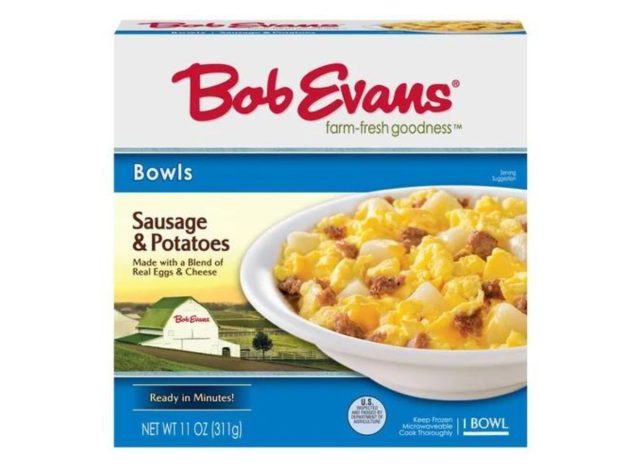

Per serving: 440 calories, 25 g fat (12 g saturated fat), 1,470 mg sodium, 17 g carbs (1 g fiber, 4 g sugar), 36 g protein
The idea of having a hot egg and sausage breakfast ready to go in minutes is appealing, but when you see the 12 grams of saturated fat and almost 1,500 milligrams of sodium, you may want to think about other options.
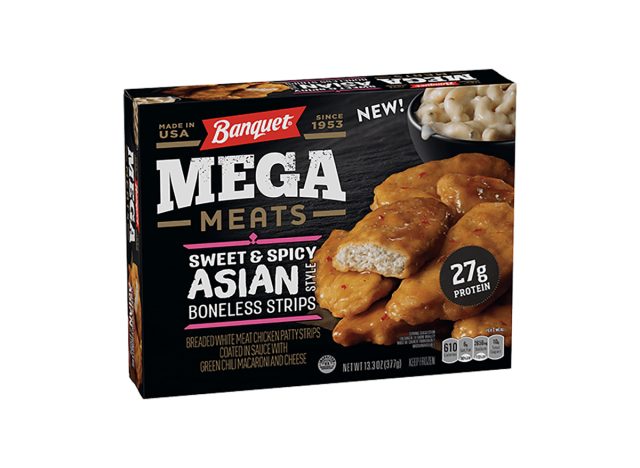

Per serving: 610 calories, 27 g fat (6 g saturated fat), 2,650 mg sodium, 65 g carbs (2 g fiber, 10 g sugar), 27 g protein
We can discuss the six grams of saturated fat or the use of sodium phosphates in these Sweet & Spicy Asian Style chicken strips from Banquet, but the number one concern that needs to be mentioned is the shocking 2,650 milligrams of sodium per serving! That is hundreds more milligrams than is recommended in an entire day.
Ice Cream & Dessert
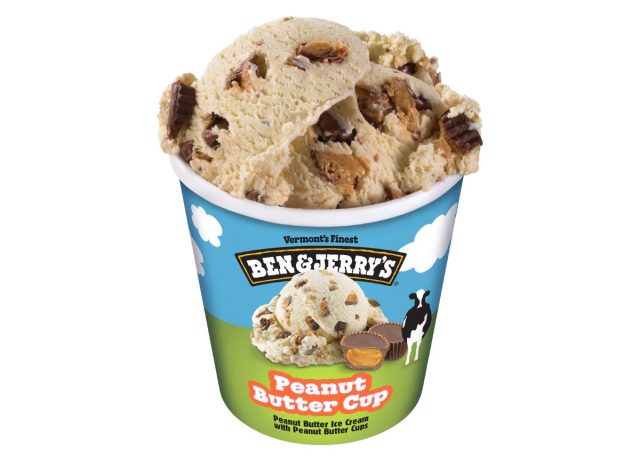

Per serving: 460 calories, 32 g fat (18 g saturated fat, 0.5 g trans fat), 170 mg sodium, 37 g carbs (2 g fiber, 34 g sugar), 9 g protein
When you’re in the mood for a sweet treat, Ben & Jerry’s always delivers. But with flavors like Peanut Butter Cup—which contains 18 grams of saturated fat, 34 grams of sugar, and 0.5 grams of trans fat per serving—it’s best to save it for special occasions instead of getting used to eating it on a regular basis. Not to mention that these numbers are for a small serving size of just 2/3 cup, and it’s all too easy to eat more.
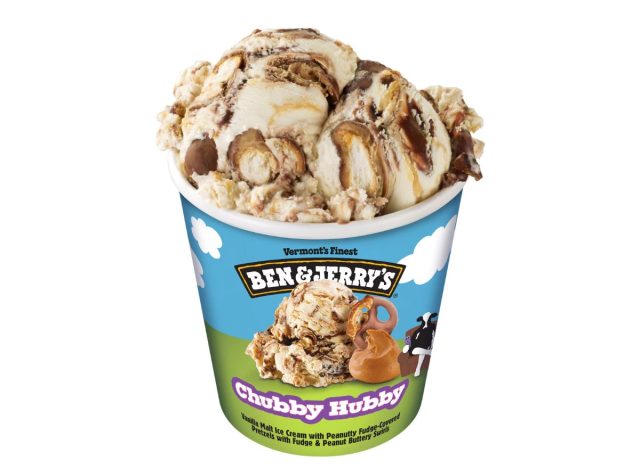

Per serving: 470 calories, 28 g fat (16 g saturated fat), 290 mg sodium, 44 g carbs (2 g fiber, 35 g sugar), 9 g protein
Another beloved Ben & Jerry’s flavor—Chubby Hubby—is considered an unhealthy grocery item because it has more saturated fat in a serving than what is recommended in an entire day! It also contains 35 grams of sugar and 106 grams if you decide to indulge in the whole pint.
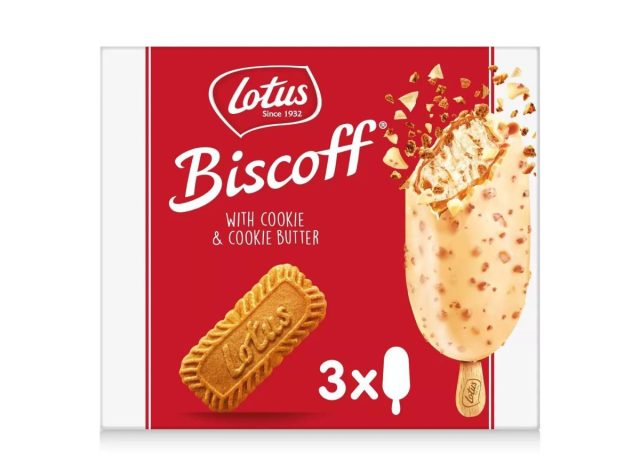

Per serving: 300 calories, 20 g fat (9 g saturated fat), 115 mg sodium, 29 g carbs (0 g fiber, 24 g sugar), 2 g protein
With the combination of white chocolate, cookie butter, and Biscoff cookies, these Cookie Butter Ice Cream Bars are a sweet and satisfying dessert. However, moderation is best here, because in just one bar you’re still getting 24 grams of sugar and nine grams of saturated fat.
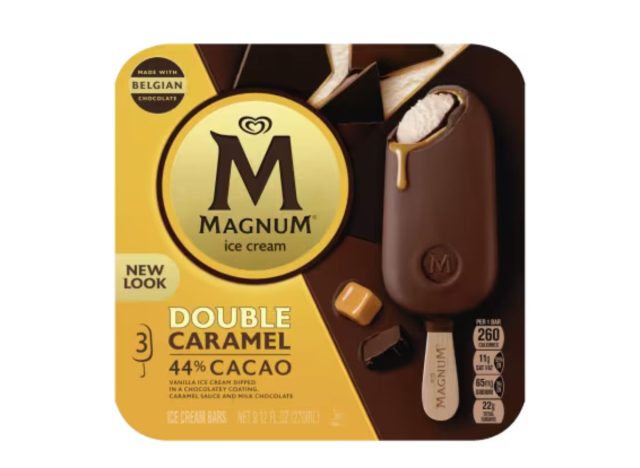

Per serving: 260 calories, 17 g fat (11 g saturated fat), 65 mg sodium, 27 g carbs (1 g fiber, 22 g sugar), 3 g protein
Magnum serves up some deliciousness with these Double Caramel Ice Cream Bars, but stick to just one if you can. In one bar you’ll still consume close to your daily limit of saturated fat, along with 22 grams of sugar. The fiber and protein content is super low, so you won’t have anything to slow down your blood sugar spikes.
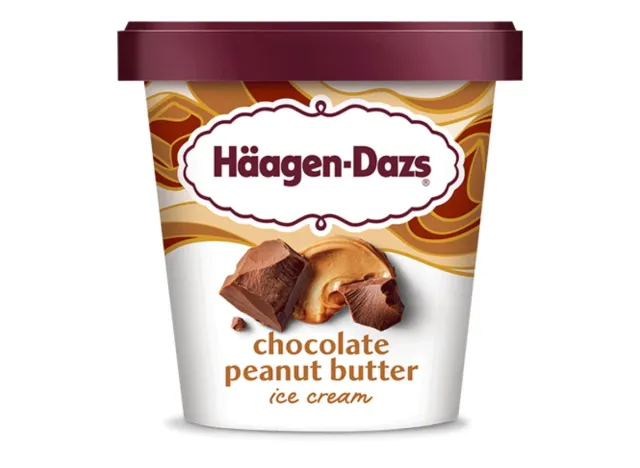

Per serving: 300 calories, 20 g fat (9 g saturated fat), 65 mg sodium, 25 g carbs (2 g fiber, 21 g sugar), 7 g protein
Another classic ice cream company to grab a pint from is Haagen-Dazs, which offers a variety of affordable flavors at most grocery stores. Unfortunately, even though their Chocolate Peanut Butter flavor is to die for, it won’t deliver what you’re wanting in terms of nutrition. One serving will get you nine grams of saturated fat and 21 grams of sugar, so you’re better off finding something on the lighter end.

